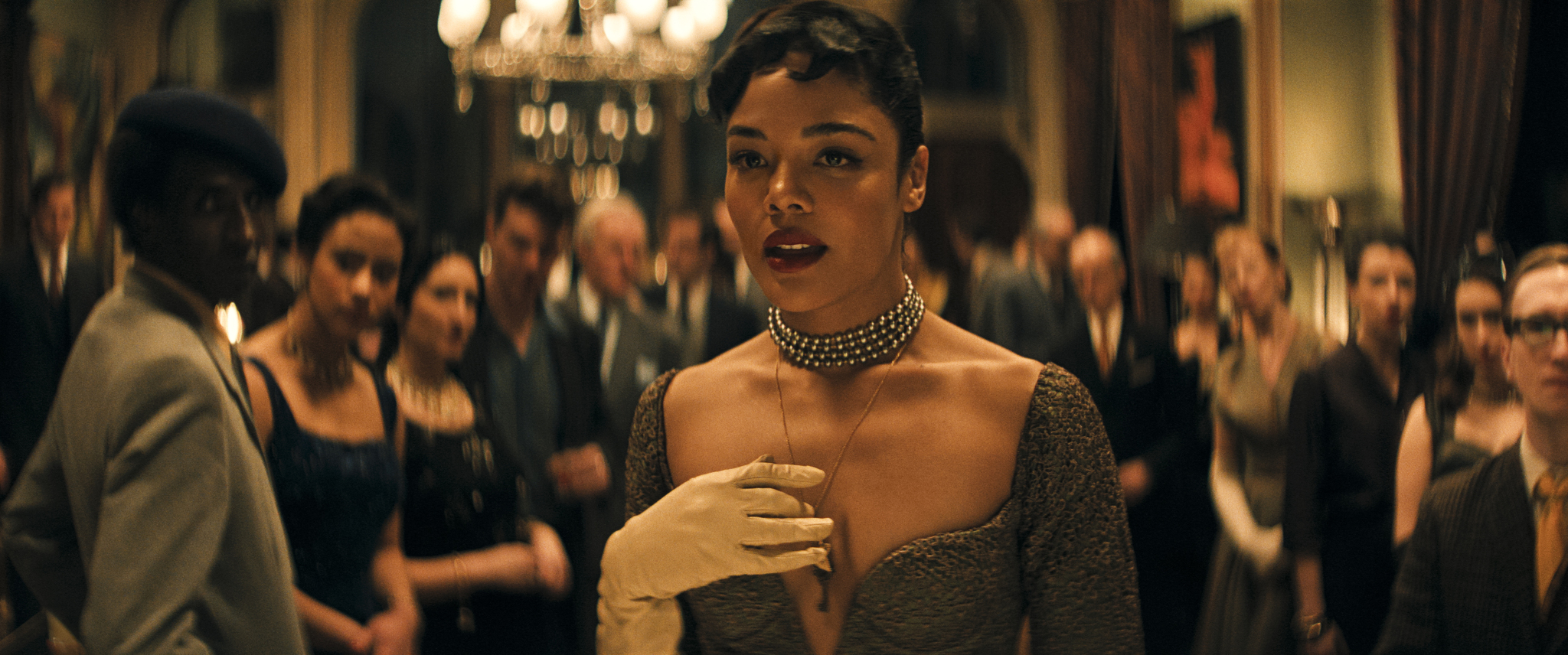Late in James Vanderbilt’s “Nuremberg” (a fraught title, but still better than the book the film is based on, the chewy “The Nazi and the Psychiatrist”), we finally get to the necessary. Most people who hear the word “Nuremberg” these days — though certainly not all, a problem the film will attempt to grapple with — inevitably picture the German city where the 1945 and 1946 trials of some of the Nazi’s highest-ranking leaders took place. Those trials were vividly brought to life in Stanley Kramer’s 1961 classic “Judgment at Nuremberg,” which notably included real footage of the Nazi concentration camps to illustrate some of the horrors that were perpetrated by the accused (and, of course, later convicted).
Vanderbilt attempts the same in his film’s final act. As with Kramer’s film, the footage nearly stops time, astonishing and horrifying and revolting, as the courtroom and its many inhabitants attempt to process what they are seeing. It’s the darkest moment of a film that shouldn’t need to crib liberally from its predecessor to make its mark, and yet does just that, repeatedly, and in a multitude of ways.
In both feel and form, “Nuremberg” is either classic or staid, depending on your stomach for such films. All of it is necessary. None of it is new. If there are people who still need to be convinced that the Holocaust did indeed happen — and, tragically, yes, that seems to be the case these days — bits of “Nuremberg” might battle back their woeful misunderstandings. But in trying to sell the idea that what happened during World War II is timely above all else, the historic tragedy itself is forgotten. That the film is so deeply rooted in reminding people of the perils of politicizing hatred is a cruel irony; by making this about today, we lose the potent lessons of yesterday.
Based on Jack El-Hai’s 2013 book and with a script by Vanderbilt, the film opens with punchy promise. It is the spring of 1945. Hitler is dead. The war is, in many respects (but crucially, not all), over. Hermann Göring (a deeply invested Russell Crowe) — the highest-ranking German military official of all time, a man so powerful in the Nazi party that he was given the title of Reichsmarschall, a designation created entirely for him and that made him superior to every single German military officer — has been arrested. And he, along with two dozen or so major Nazi players, has been thrown into a secret military prison as the Allies determine what they will do with them.
U.S. Supreme Court Justice Robert H. Jackson (a restrained but still powerful Michael Shannon) has an idea: a trial, a tribunal, in which the Allies will come together to try and convict the Nazis. Jackson’s idea (the film doesn’t try to make the trial entirely his concept, but comes damn close) doesn’t have much legal precedence, but he’s convinced it’s the only way to not only punish these evil-doers, but make them such pariahs that Germany wouldn’t dare to rise again (just as they had after World War I and its own kind of punishments). At the same time that Jackson and his team are preparing the trial, the army dispatches psychiatrist Douglas Kelley (Rami Malek) to get into the prisoners’ minds before they are tried.
But Kelley approaches the task with a twofold plan: He’d like to eventually write a book about what he discovers about his patients (like Göring, the good doctor was, at heart, pretty ambitious), one that will help everyone “dissect evil” so that we might battle it better. But while Jackson and Kelley should feel aligned in their aims, “Nuremberg” keeps them far apart and at odds, instead turning its attention on the growing bond between Kelley and Göring.
That Kelley and Göring become something like friends is essential to the entire thrust of the film and Kelley’s eventual findings — there’s nothing inherently different about these evil men, and they may even be able to sway good men to their side through charming chatter and shared experience — but it’s delivered in the most plain-faced way possible. There is no cat-and-mouse here. There are few surprises. Kelley goes all-in too early (only a scene-stealing Leo Woodall, as an American solider with a secret, brings the appropriate level of dubiousness to the pair’s exchanges). Early wins for Kelley (ah ha, Göring does understand English!) go nowhere.
Instead, we watch the two men chatter and bicker, playing games both of the head and board variety, waiting for something — anything — to change between them. As Jackson and his team assemble a case and courtroom just feet from the war criminal’s cells, “Nuremberg” tries to build its own arguments (the courtroom and cells, it must be noted, look fantastic, thanks to production designer Eve Stewart). It’s never clear what they are. Göring is charming? Kelley is a stooge? The Nazi leaders didn’t know anything? They knew everything? This is complicated stuff? It is, and it also isn’t, but “Nuremberg” never quite finds that line.
Once Kelley starts visiting Göring’s wife and daughter, getting cozy, teaching Göring’s cute kiddo magic kids, and ferrying messages back and forth to boot, things get really sticky. What exactly is Kelley getting out of this? We’re long past the doc ingratiating himself with Göring for information — and how silly to assume that either man was stupid enough to ever forget the very real power dynamics in their interactions — and so these visits seem to exist simply for discomfort’s sake.
That the real Kelley was married during this period is never mentioned (Kelley, in many ways, is wholly unknowable to us). That perhaps he missed his own wife (with whom he would go on to have three children) and wanted some temporary domestic comforts is never considered. Easy enough characterization, likely true, and yet fully skated over here. Malek is quite good in the role, thin as it might be, bringing real curiosity and confusion to Kelley, portraying him as someone inscrutable who really didn’t want to be.
Despite the heavy nature of the film, there’s an odd streak of peppiness to some of its proceedings. There are little asides about Göring’s self-obsession that scan as funny (when he surrenders to the military, he only asks them to carry his luggage, hardy-har-har) and sequences that only flow because of snappy overlapping dialogue (“We’ll never get Russia on board!” cut to “Sir, Russia is on board!”). It’s a small distraction before the necessary: getting to the trial, getting to something closer to the truth, getting to testimony and not chatter.
By the time Vanderbilt unspools that same iconic, wrenching footage that Kramer used decades ago, its potency feels different. We’ve seen it all before. We need to see it again. But in the space between those two statements, “Nuremberg” can’t find much new to say. Saying something old is certainly better than not saying anything at all, but how, at this moment, can we still be leaning on the old words and the old ways? There has to be something more. The future and the past demand it.
Grade: C+
“Nuremberg” premiered at the 2025 Toronto International Film Festival. Sony Pictures Classics will release the film in theaters on Friday, November 7.
Want to stay up to date on IndieWire’s film reviews and critical thoughts? Subscribe here to our newly launched newsletter, In Review by David Ehrlich, in which our Chief Film Critic and Head Reviews Editor rounds up the best new reviews and streaming picks along with some exclusive musings — all only available to subscribers.



